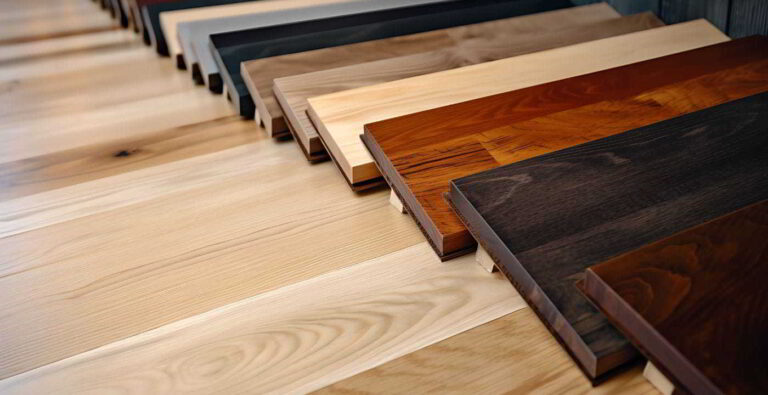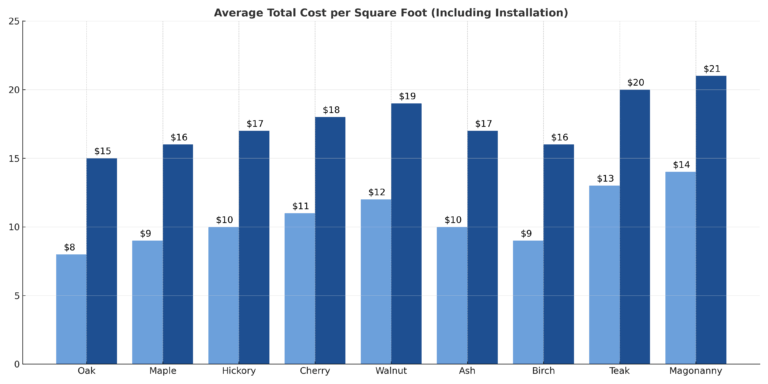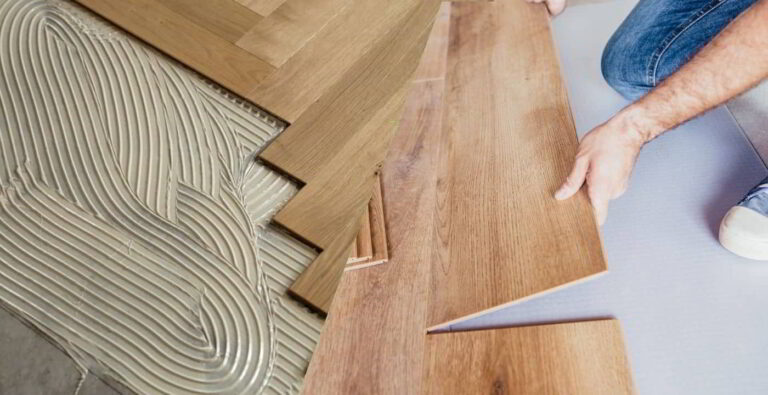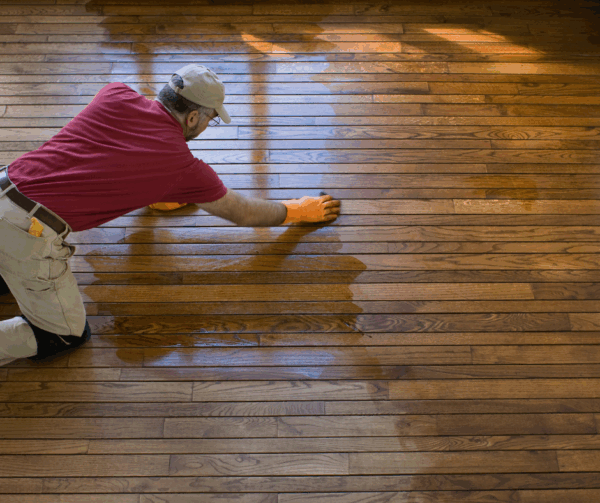
Hardwood Flooring Cost Breakdown
If you’re planning a flooring project, knowing the costs helps with budgeting. Here’s a look at the cost per square foot:
| Size by Square Feet | Low-End Estimate | Average Cost | High-End Estimate |
|---|---|---|---|
| 500 | $3,000 | $7,750 | $11,500 |
| 1,000 | $6,000 | $14,500 | $23,000 |
| 1,500 | $9,000 | $21,750 | $34,500 |
| 2,000 | $12,000 | $29,000 | $46,000 |
| 2,500 | $15,000 | $36,250 | $57,500 |
| 3,000 | $18,000 | $43,500 | $69,000 |
We offer Luxury Vinyl, Laminate, and Tile flooring. Financing options are available, and you can visit our showroom.
Materials: $4 to $12 per square foot
The type of flooring material affects how much a project costs. Options range from common to more unique types, each with its own look and price.
Domestic Flooring
Domestic types like oak, maple, and hickory are easy to find and usually cost between $4 to $8 per square foot. They are strong and flexible choices for homes.
Exotic Flooring
Exotic types like Brazilian cherry, teak, and mahogany are known for their special patterns and deep colors. They cost more, from $8 to $12 per square foot, but offer a unique look that many like.
| Species | Average Cost per Square Foot (Materials Only) | Average Total Cost per Square Foot (Including Installation) |
|---|---|---|
| Oak | $4 – $8 | $8 – $15 |
| Maple | $5 – $9 | $9 – $16 |
| Hickory | $6 – $10 | $10 – $17 |
| Cherry | $7 – $11 | $11 – $18 |
| Walnut | $8 – $12 | $12 – $19 |
| Ash | $6 – $10 | $10 – $17 |
| Birch | $5 – $9 | $9 – $16 |
| Teak | $9 – $13 | $13 – $20 |
| Mahogany | $10 – $14 | $14 – $21 |

Labor: $4 to $8 per square foot
Labor costs can be 50% to 70% of what you pay. Having professionals install flooring means it is done right.
Labor costs usually include putting in the flooring and getting the subfloor ready.
Installation
Putting in flooring needs skill for a perfect look. Installers might charge $4 to $8 per square foot for labor, depending on how hard the job is and local rates.
Finishing
Besides installation, labor can include finishing work like sanding and sealing to make floors look good and last long.

Subfloor Preparation: $1 to $2 per square foot
Getting the subfloor ready is important for making sure the flooring lasts a long time. This might involve fixing uneven spots, repairing damage, and adding moisture barriers.
Leveling
If the subfloor is uneven or damaged, leveling might be needed for a smooth surface.
Leveling usually costs between $1 and $2 per square foot, depending on the work needed.
Moisture Protection
Moisture can harm flooring, so a moisture barrier is vital—especially in damp areas.
Installing a moisture barrier usually costs between $1 and $2 per square foot.
Removal of Existing Flooring: $1 to $3 per square foot
Before putting in new flooring, any old flooring like tile or laminate might need to be taken out. This makes sure the surface is smooth for the new floor.
Tile or Laminate Removal
Removing tile or laminate flooring might need more work and tools, with costs usually between $2 to $3 per square foot.
Summary of Flooring Cost Breakdown:
- Tile/Laminate Removal: $2 – $3 per sq ft
- Leveling: $1 – $2 per sq ft
- Moisture Barrier: $1 – $2 per sq ft
- Installation Labor: $4 – $8 per sq ft
- Finishing Services: Usually included in installation or priced separately for custom finishes

Solid Hardwood Flooring Installation
Solid hardwood flooring is known for being beautiful and strong. The cost to install it is usually between $11 to $25 per square foot, which includes both materials and work.
Prices change based on wood type, how hard it is to install, and extra services needed.
Installation Method
How you install it affects the price. The usual nail-down installation is often cheaper than glue-down or floating installations.
Additional Services
Extra work during installation can raise costs. This might include:
- Subfloor preparation: fixing uneven areas or damage
- Moisture barrier installation: vital in wet places
- Staining and finishing: makes the floor look better and last longer, often costs extra

Engineered Hardwood Flooring Installation
Engineered hardwood flooring is strong and stylish, making it popular with homeowners. The cost for installation ranges from $7 to $20 per square foot, including materials and labor.
Choosing exotic woods or thick veneers can make it more expensive. The veneer and finish type also affect price and durability.
Installation Method
The method can change your total cost:
- Floating floors are usually cheaper and simpler to install.
- Glue-down or nail-down installations may cost more due to extra work and materials.
- Difficulties such as radiant heating systems or uneven subfloors might add extra costs.
Factors That Affect Hardwood Flooring Costs
| Cost Factor | Details |
|---|---|
| Wood Type | Species affect price. Exotic woods like Brazilian cherry cost more than common ones like oak or maple. |
| Wood Quality | Engineered hardwood usually costs less than solid hardwood but looks and performs similarly. |
| Installation Method | Floating floors generally cost less to install than glue-down or nail-down types. |
| Room Size | Bigger rooms need more materials and work, increasing costs. |
| Subfloor Condition | Repairs, leveling, or moisture protection for subfloors will raise costs. |
| Additional Features | Borders, inlays, or custom designs can significantly increase the price. |
| Additional Services | These include removing old flooring, subfloor work, or installing baseboards or underlayment. |
Professional vs DIY Flooring Installation
When installing flooring, homeowners often decide between hiring professionals and doing a DIY project. Each method has pros and cons depending on your budget, timeline, and comfort with tools and detailed work.
Professional Installation
Advantages
- Expertise: Skilled pros ensure accurate measurements, plank alignment, and finishing techniques.
- Efficiency: Installers work quickly with the right tools, reducing errors and delays.
- Warranty: Most professional installations include a labor warranty or guarantee.
- Flawless Finish: Includes sanding, staining, and sealing for a polished look.
Drawbacks
- Cost: Hiring a pro increases the total project cost because of labor fees.
DIY Installation
Advantages
- Cost Savings: No labor fees, ideal for small projects or tight budgets.
- Flexible Timing: Work at your own pace and schedule.
- Skill Building: Learn and develop new home improvement skills.
Drawbacks
- Quality Risks: Mistakes like misaligned planks or uneven seams can affect the final look.
- Physically Demanding: Requires strength, patience, and long periods of kneeling or lifting.
Ready to Turn Your Hardwood Flooring Vision Into Reality?
Picking the right flooring is important. Now you know the main cost factors, you’re closer to creating the perfect space. You don’t have to do it alone.
We would love to help you explore flooring options in a free consultation with our flooring installation experts. From choosing the right type to understanding installation and budgeting, our team is here to ensure you get floors you’ll enjoy for a long time.
Contact us today to schedule your free in-home flooring consultation and see if we serve your area.




